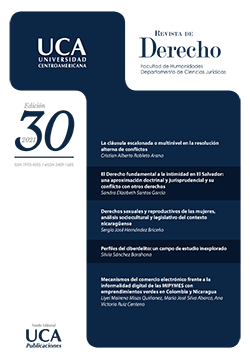Cybercrime profiling: an unexplored field of study
DOI:
https://doi.org/10.5377/derecho.v1i30.12223Keywords:
Cybercrime, Profiling, Criminology, Crime legislationAbstract
A qualified analysis on the effects and expansion of cybercrimes requires a specialized approach from a Criminologist´s point of view. The profiling of cybercrime incidents allows us to collect relevant information about some behavioral facts that have been molded by the constant evolution of technology. Some issues have triggered the outreach of a cybercrime environment like hyper-connectivity trends, an anonymous professional profile in the use of up-to-date technology or the self-acquired skills to use software programs in a cybercrime anonymous space, or the use of cybercrime as a resource to target down against individual victims and political and economic infrastructures.
Social changes generated by technology innovations have a direct effect on our economic, social, and political well-being. For each technological innovation there is a parallel world where an antisocial behavior merges and uses technology for its own benefit and to infringe damage to individuals and/or any political or economic network.
One of the main objectives of this article is to outline the importance of Criminology studies as part of the specialized training for all Justice workers in Central America´s judicial system in order to draw and enforce assertive crime policies in the region that counterbalance the rapid expansion of cybercrime.
Through the identification of cybercrime motivations, we can elaborate interesting field studies about this criminological phenomenon in our Latin American region. Both prevention and efforts against the expanding of cybercrimes are the main priorities in the coordination and cooperation strategies of various police institutions in our region (see Ameripol or Interpol), as a reminder of the Budapest Convention cyber security guidelines and other international liaisons approved and established in the Central American region to work against all types of organized crime, including cybercrimes.
Downloads
1879
HTML (Español (España)) 100
Published
How to Cite
Issue
Section
License
Copyright (c) 2021 Universidad Centroamericana

This work is licensed under a Creative Commons Attribution-NonCommercial-ShareAlike 4.0 International License.
© Copyright Universidad Centroamericana (UCA)
The author undertakes not to submit any article to any other journal or publication simultaneously.The content of the research article is the sole responsibility of the author, as a result, the Law Journal is released from any responsibility derived from the content of the work.
The author assigns the Revista de Derecho, the right to publish the article, distribute it and market it in the way he considers convenient, nationally and internationally, in printed and electronic format;as well as its inclusion in directories, bibliographic bases and international indexes.

This work is licensed under a licencia de Creative Commons Reconocimiento-NoComercial-CompartirIgual 4.0.




